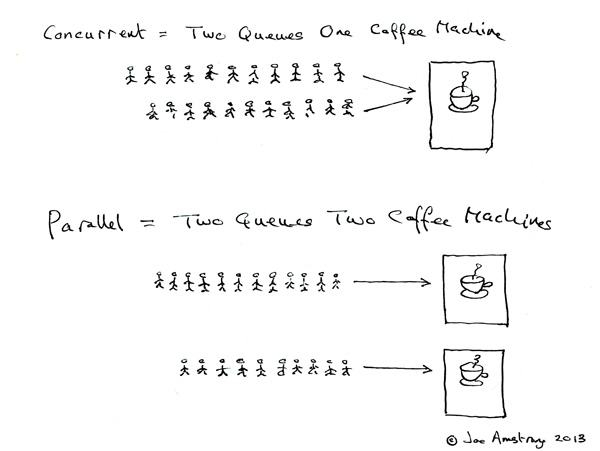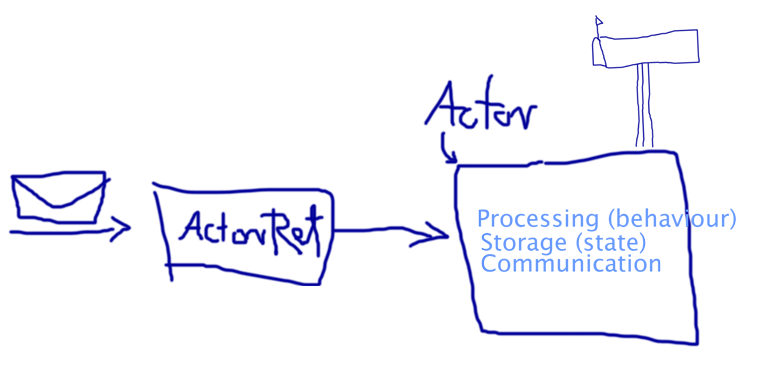Akka (notes, part 1)
2014-12-01Akka traits
Akka has 4 main traits. Those are:
- Responsive - the system responds very fast.
- Resilient - the system stays responsive in the face of failure.
- Elastic - the system stays responsive under varying workload. You can easily add/remove nodes (machines) to/from system.
- Message Driven - object talks through messages. Objects are loosely coupled. There is a big diffrence between event and message - every message has recipient address, but events don’t have to have it.
Please see Reactive Manifesto for more information.
Concurrency vs parallelism
- Definition 1
- Concurrency is when two tasks can start, run, and complete in overlapping time periods. It doesn’t necessarily mean they’ll ever both be running at the same instant. Eg. multitasking on a single-core machine.
- Parallelism is when tasks literally run at the same time, eg. on a multicore processor.
- Definition 2
- Concurrency A condition that exists when at least two threads are making progress. A more generalized form of parallelism that can include time-slicing as a form of virtual parallelism.
- Parallelism A condition that arises when at least two threads are executing simultaneously.
Ref: stackoverflow.com.
Example
- Concurrency - two queues, one coffee machine
- Parallelism - two queues, two coffee machines

Source: joearms.github.io.
Actor, ActorRef

- Each actor has dispatcher and mailbox.
- If we send message to actor, it will add message to its mailbox and it will return immediately - this is not blocking operation.
- If we create actor,
actorOfwill return immediatelyActorRef. It does not wait to create an instance. If we send messages to actor that is “not started”, messages will be added to mailbox and will be processed when actor is inicialized - we will not lose any message. Dispatcherassigns (schedules) thread to process the message.- Many actors have the same dispatcher - it is some kind of thread pool.
- One message is passed to the actor
- Only one thread can be in receive block (“single-threaded illusion”).
- Actors could have mutable state (but rember not to share mutable state!).
- Messages must be immutable.
How to handle “unhandled” messages
If in receive block we do not handle some message, this message will be dropped (and maybe logged). We can use unhandled method to do something with messages not handled in receive block.
override def unhandled(message: Any): Unit = ???
Top-Level Actor
If you create top-level actors, use factory methods - it will simplify testing. Always give name to your top-level actors.
val topLevelActor = createTopLevelActor()
def createTopLevelActor(): ActorRef = system.actorOf(TopLevel.props, "top-level")
Message protocol
- Defince your message protocol in the companion object of the actor.
- If you use message protocol from other actor, use actor name as prefix to this message - this will make code more readable.
object FooActor {
case object FooMessage
}
class FooActor extends Actor {
import FooActor._
override def receive: Receive = {
case FooMessage => ???
case BarActor.BarMessage => ???
}
}
object BarActor {
case object BarMessage
}
class BarActor extends Actor {
import BarActor._
override def receive: Receive = {
case FooActor.FooMessage => ???
case BarMessage => ???
}
}
Actor DSL
To create anonymous actoes we can use Actor DSL. Here, actor takes the role of either system.actorOf or context.actorOf. It takes an implicit ActorRefFactory and creates the new Actor.
import akka.actor.ActorDSL._
val a = actor(new Act {
become {
case "hello" => sender() ! "hi"
}
})
Best practices
- Always create
Propsfactory - the best place for that is in companion object (see: Actors — Akka Documentation). - Put Companion Object before you class.
- Use
sender()with parentheses. It is function, not val and you have to rember about it. It can be very tricky whensender()will be execute in other thread - in example inFuture.
Example:
class WrongWayActor extends Actor {
override def receive: Receive = {
case _ => Future {
val result = doSomeHeavyComputation
sender() ! result // if you reacive other message in meantime, it will send the response to WRONG actor
}
}
}
class GoodWayActor extends Actor {
override def receive: Receive = {
case _ =>
val originalSender = sender()
Future {
val result = doSomeHeavyComputation
originalSender ! result // it closes clouser over - it will send response to right actor
}
}
}
